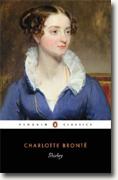Shirley
Charlotte Bronte
book reviews:
· general fiction
· chick lit/romance
· sci-fi/fantasy
· graphic novels
· nonfiction
· audio books
· author interviews
· children's books @
curledupkids.com
· DVD reviews @
curledupdvd.com
newsletter
win books
buy online
links
home
for authors
& publishers
for reviewers

 |
Shirley Charlotte Bronte Penguin Classics Paperback 624 pages September 2006 |
|
Shirley was Bronte’s second novel, following Jane Eyre. It was not as well received as her first work, but despite its weaknesses it is an engrossing story of mismatched love affairs and the rise of the machine era in Yorkshire England.
Through Caroline and Shirley, Bronte examines the plight of unmarried women in the 1840s. Caroline is not permitted a career, not even as a governess, because her family forbids it, and must find solace in books and stitching items for the poor. Shirley, on the other hand, has an income of one thousand pounds a year so has a bit more freedom but still feels bound by her family’s opinion of who she may marry. This rich novel is filled with social commentary. The Church of England, industrial tensions, and the role of “old maids” come under fire. Bronte fearlessly opens fire on three local curates, whom she reviles as young men who meet only to quarrel and eat the others food. When Shirley takes on the plight of the poor in her community, she refuses to allow the curates to make a single decision as to how her money should be spent, nor does she want their advice. Ironically, at this period of time Bronte believe she would never married and patterned the character of one of the curates after the man she would marry in later years. Moore’s thought processes and decisions seem to parallel the corporate mentality that is the rage in industrialized nations today. The role of women seems forever to be up for debate then and now. All these points make this book as interesting and relevant today as when Bronte wrote it in 1849 under the name Currer Bell. Originally published on Curled Up With A Good Book at www.curledup.com. © Pamela Crossland, 2006 |
| Also by Charlotte Bronte: |
|
|
|
 Click here to learn more about this month's sponsor! |
|
| fiction · sf/f · comic books · nonfiction · audio newsletter · free book contest · buy books online review index · links · · authors & publishers reviewers |
|
| site by ELBO Computing Resources, Inc. | |
 Mill owner Robert Moore has seized upon machinery to save his company from going under; these labor saving devices will save money when he most needs it. The former employees are going hungry, however, and they are determined to block his path so that their families may survive. Moore knows he needs capital to keep going and considers marriage to the wealthy Shirley Keeldar despite his deep affection for his cousin Caroline. Shirley, in true Bronte fashion, loves Moore’s brother, a penniless tutor.
Mill owner Robert Moore has seized upon machinery to save his company from going under; these labor saving devices will save money when he most needs it. The former employees are going hungry, however, and they are determined to block his path so that their families may survive. Moore knows he needs capital to keep going and considers marriage to the wealthy Shirley Keeldar despite his deep affection for his cousin Caroline. Shirley, in true Bronte fashion, loves Moore’s brother, a penniless tutor.